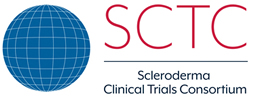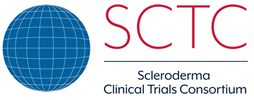Skin Working Group
Gordon JK, Merkel P, Khanna D
The goal of this SCTC Working Group is to explore ways to improve the assessment of skin disease in SSc.
Last year at SCTC meeting this group met. We discussed the following areas for further research:
- Explore the controversy regarding whether technique in performing mRSS affects performance characteristics of the mRSS in clinical trials. Commonly-used techniques for a given area of the body include choosing a maximum score, a representative area, or a global average. Examiners who choose a maximum score assign a score that represents the most severe involvement. For example, when assessing the forearm, if the distal area has a patch that is considered 3, but the remainder of the forearm is a 1, the score of 3 would be selected. Examiners who choose a representative area would score the most common (or predominant) thickness. In the previous example, the examiner would select 1 as the score. Examiners who score using the global average palpate the individual areas and take the average. In the above example, the forearm might be scored as a 2. If the examiner is consistent with his or her approach to scoring each time, the mRSS will be valid in the course of a trial. However, it is possible that maximizing the score may lead to decreased sensitivity to change of the mRSS. This working group plans to explore this controversy.
- Given that certain areas of the body remain static, we also asked whether decreasing number of sites assessed in the mRSS could increase the sensitivity to change.
- Further goals of this group will include investigation of complementary methods of assessing skin disease that can studied as secondary outcomes in clinical trials. Ideas include percentage change mRSS, percentage of body involvement, and possibly use of skin biopsies, ultrasound, or durometry depending on investigator interest.
Importantly, the Working Group seeks to align its agenda with the SCTC’s efforts to standardize skin scoring and advance the science of clinical trials in SSc.
Publications:
Kimberly Showalter, Peter A Merkel, Dinesh Khanna and Jessica K Gordon; for the Scleroderma Clinical Trials Consortium. Assessment of skin disease in scleroderma: Practices and opinions of investigators studying scleroderma. Journal of Scleroderma and Related Disorders 2020, Vol. 5(3) 167– 171
Contacts:
- Jessica Gordon: [email protected]
- Peter A. Merkel: [email protected]
- Dinesh Khanna: [email protected]
Working Group Summaries
Pay Membership Fees
If you are a newly accepted member of the SCTC, please select Initial Fee at $250.00 USD.
If you are a returning member of the SCTC, please select the option of Annual Fee at $200.00 USD.
If your institution is unable to use PayPal, please contact [email protected].






